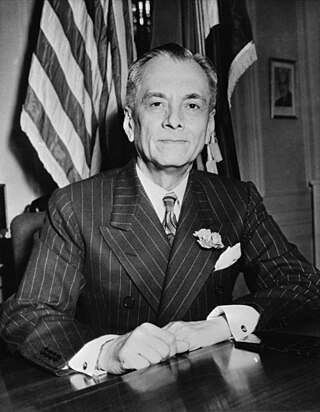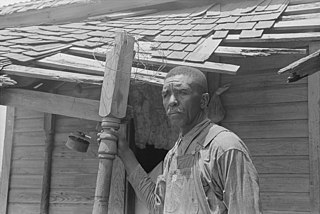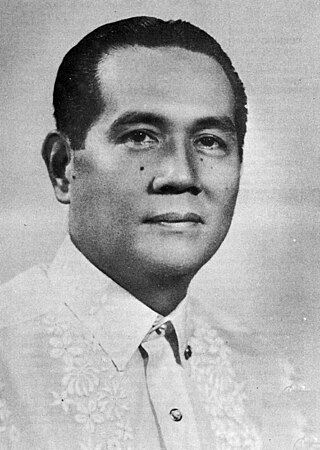Related Research Articles

The Commonwealth of the Philippines was an unincorporated territory and commonwealth of the United States that existed from 1935 to 1946. It was established following the Tydings–McDuffie Act to replace the Insular Government of the Philippine Islands and was designed as a transitional administration in preparation for full Philippine independence. Its foreign affairs remained managed by the United States.

Manuel Luis Quezon y Molina, also known by his initials MLQ, was a Filipino lawyer, statesman, soldier, and politician who was president of the Commonwealth of the Philippines from 1935 until his death in 1944. He was the first Filipino to head a government of the entire Philippines and is considered the second president of the Philippines after Emilio Aguinaldo (1899–1901), whom Quezon defeated in the 1935 presidential election.

A tenant farmer is a person who resides on land owned by a landlord. Tenant farming is an agricultural production system in which landowners contribute their land and often a measure of operating capital and management, while tenant farmers contribute their labor along with at times varying amounts of capital and management. Depending on the contract, tenants can make payments to the owner either of a fixed portion of the product, in cash or in a combination. The rights the tenant has over the land, the form, and measures of payment vary across systems. In some systems, the tenant could be evicted at whim ; in others, the landowner and tenant sign a contract for a fixed number of years. In most developed countries today, at least some restrictions are placed on the rights of landlords to evict tenants under normal circumstances.

Diosdado Pangan Macapagal was a Filipino lawyer, poet and politician who served as the ninth President of the Philippines, serving from 1961 to 1965, and the sixth Vice President, serving from 1957 to 1961. He also served as a member of the House of Representatives, and headed the Constitutional Convention of 1970. He was the father of Gloria Macapagal Arroyo, who followed his path as President of the Philippines from 2001 to 2010.
A leasehold estate is an ownership of a temporary right to hold land or property in which a lessee or a tenant has rights of real property by some form of title from a lessor or landlord. Although a tenant does hold rights to real property, a leasehold estate is typically considered personal property.

Land Bank of the Philippines, is a government-owned bank in the Philippines with a special focus on serving the needs of farmers and fishermen. While it provides the services of a universal bank, it is officially classified as a "specialized government bank" with a universal banking license.
The Democratic Alliance was a leftist party in the Philippines created on July 15, 1945, primarily composed of members of the National Peasants Union of the Hukbalahap, the Committee of Labor Organizations of the Communist Party of the Philippines, the Filipino Blue Eagle Guerrillas, and other organizations. The party supported and endorsed the bid of incumbent president Sergio Osmeña and the Nacionalista Party during the 1946 presidential elections against Manuel Roxas and the Nacionalista's liberal wing due to the latter's sympathetic attitude towards Filipino collaborators of the Japanese during World War II and close affiliation with "vested-interest landlord groups".

The history of the Philippines from 1898 to 1946 is known as the American colonial period, and began with the outbreak of the Spanish–American War in April 1898, when the Philippines was still a colony of the Spanish East Indies, and concluded when the United States formally recognized the independence of the Republic of the Philippines on July 4, 1946.

The Agricultural Sector Alliance of the Philippines, Inc. (AGAP) is a party-list in the Philippines. The organization was established in 2003 in order to protect and promote the welfare of farmers. Since then, it has been actively pursuing all endeavors that would benefit the entire agricultural industry nationwide.
The Mendiola massacre was an incident that took place in Mendiola Street, San Miguel, Manila, Philippines on January 22, 1987, in which state security forces under President Corazon Aquino violently dispersed a farmers' march to Malacañang Palace in protest for the lack of government action on land reform.
The Constitution of the Philippines is the constitution or the supreme law of the Republic of the Philippines. Its final draft was completed by the Constitutional Commission on October 12, 1986, and ratified by a nationwide plebiscite on February 2, 1987.
The national symbols of the Philippines consist of symbols that represent Philippine traditions and ideals and convey the principles of sovereignty and national solidarity of the Filipino people. Some of these symbols namely the national flag, the Great Seal, the coat of arms and the national motto are stated in the Flag and Heraldic Code of the Philippines, which is also known as Republic Act 8491. In the Constitution of the Philippines, the Filipino language is stated as the national language of the Philippines. Aside from those stated symbols in the Constitution and in Republic Act 8491, there are only six official national symbols of the Philippines enacted through law, namely sampaguita as national flower, narra as national tree, the Philippine eagle as national bird, Philippine pearl as national gem, arnis as national martial art and sport and the Filipino Sign Language as the national sign language. Thus, there is a total of twelve official national symbols passed through Philippine laws.
The Comprehensive Agrarian Reform Program, more commonly known as CARP, is an agrarian reform law of the Philippines whose legal basis is the Republic Act No. 6657, otherwise known as the Comprehensive Agrarian Reform Law (CARL), signed under the administration of President Cory Aquino. It is the redistribution of private and public agricultural lands to help the beneficiaries survive as small independent farmers, regardless of the “tenurial” arrangement. Its goals are to provide landowners equality in terms of income and opportunities, empower land owner beneficiaries to have equitable land ownership, enhance agricultural production and productivity, provide employment to more agricultural workers, and put an end to conflicts regarding land ownership.

Hacienda Luisita is a 6,453-hectare sugar plantation located in the province of Tarlac. The hacienda spans 11 barangays in three towns of Tarlac. Most of the original farmworkers reside in 10 villages – Barangays Balete, Cutcut, Lourdes, Mapalacsiao, Asturias, and Bantog in Tarlac City; Barangay Motrico in La Paz town; and Barangays Parang, Mabilog and Pando in Concepcion town. The original estate includes the Central Azucarera de Tarlac (CAT) sugar mill and a golf course. The eleventh village is Barangay Central in Tarlac City which houses the CAT sugar mill, the St. Martin de Porres Hospital and the Our Lady of Lourdes Church. It features Luisita Golf and Country Club, a golf course and Las Haciendas de Luisita Subdivision, a 5-interconnected luxury subdivision.

Arlene "Kaka" J. Bag-ao is a Filipino human rights lawyer and agrarian reform advocate who served as Governor of the Dinagat Islands from 2019 to 2022. Bag-ao additionally served as the representative for the lone district of the Dinagat Islands from 2013 until 2019. She has been dubbed as the 'Dragon Slayer' after consecutively defeating two of the most prominent members of the influential Ecleo political dynasty of the Dinagat Islands.
Agrarian reform and land reform have been a recurring theme of enormous consequence in world history. They are often highly political and have been achieved in many countries.
Land reform in the Philippines has long been a contentious issue rooted in the Philippines's Spanish Colonial Period. Some efforts began during the American Colonial Period with renewed efforts during the Commonwealth, following independence, during Martial Law and especially following the People Power Revolution in 1986. The current law, the Comprehensive Agrarian Reform Program, was passed following the revolution and extended until 2014.

Jose de Jesus Roy Sr. was a Filipino lawyer, economist, and politician who served for 25 consecutive years as a congressman and senator in the Congress of the Philippines. Known as the "poor man's economist", he drafted, authored and sponsored laws to improve the lot of the peasantry. As a member of Congress, he took particular pride in the sponsorship of almost all laws on land reform. He is also considered to be the "Father of the Philippine Banking System" because of his authorship and involvement in almost all the major finance and tariff measures since the beginning of the Third Philippine Republic in 1946.

The Scottish Land Commission was established by the Scottish Government following the passage of the Land Reform (Scotland) Act 2016 by the Scottish Parliament; the Commission also incorporates the work of the Tenant Farming Commissioner. The Lands Commissioners, who constitute the Commission, have functions relating to land in Scotland, so that they address issues which relate to ownership of land, land rights, management of land, and use of land. The Tenant Farming Commissioner has the aim of improving the relationship between tenant farmers and land owners, and can create codes of practice, provide practical guidance, and must consult on such matters. The Tenant Farming Commissioner cannot be an agricultural landlord or agricultural tenant, and will develop codes of practice which are in addition to the law and the jurisdiction of the Scottish Land Court.

The New Agrarian Emancipation Act, officially designated as Republic Act No. 11953, is a bill passed by the 19th Congress of the Philippines and signed by President Bongbong Marcos on July 7, 2023. The law frees more than 600,000 farmers from debt. The Act complements the Aquino-era Comprehensive Agrarian Reform Program, which condones farmers with awarded lands from amortizations, including interest and surcharges. About 610,054 agrarian reform beneficiaries (ARBs) tilling 1,173,101.575 hectares of land are seen to benefit from this law. The Philippine government will pay the remaining balance of the direct compensation due the landowners under the Voluntary Land Transfer (VLT) or the Direct Payment Scheme (DPS) amounting to ₱206.2 million. The law covers ₱57.56 billion in agrarian arrears.
References
- ↑ Republic Act No. 3844 (August 8, 1963), Agricultural Land Reform Code , retrieved May 10, 2021
- ↑ Malaya, J. Eduardo; Jonathan E. Malaya (2004). So Help Us God: The Presidents of the Philippines and Their Inaugural Addresses. Manila: Anvil. p. 203. ISBN 971-27-1486-1.
- ↑ Subsequent legislation includes
- Republic Act No. 6657, approved June 10, 1988
- Republic Act No. 7905, approved February 23, 1995
- Republic Act No. 7907, approved February 23, 1995
- Republic Act No. 8532, approved February 23, 1998
- ↑ Lacsamana, Leodivico Cruz (1990). Philippine History and Government. Quezon City: Phoenix Publishing House. p. 185. ISBN 971-06-1894-6.